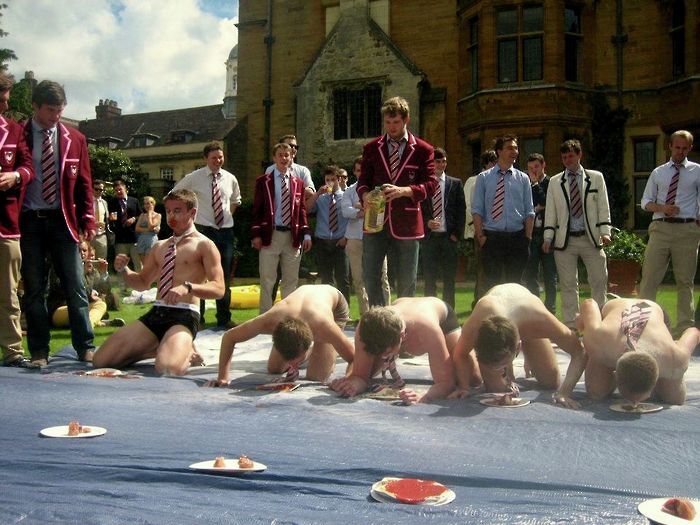New guidance could mean crackdown on university initiation ceremonies
Advice for universities has been published on hazing and initiations following the death of Newcastle student in 2016

Content Note: This article contains references to excessive alcohol consumption, bullying and sexual misconduct
With another academic year around the corner, drinking societies and sports clubs may see a crackdown on initiation ceremonies, following the publication of new national guidance.
Universities Minister Chris Skidmore has released a statement following research published by Universities UK providing universities with advice on how to deal with initiations.
Initiation ceremonies involving excessive alcohol consumption can be dangerous for students. The death of Ed Farmer, a first-year student at Newcastle, at an Agricultural Society initiation in 2016 prompted a national response to initiations, leading to new recommendations being issued.
The report defines an initiation as “any activities expected of someone joining or participating in a group that humiliates, degrades, abuses or endangers them, regardless of a person’s willingness to participate”.
Cambridge’s colleges may have to take heed, with drinking societies prevalent across the University at the college-level, although some are potentially labelled as sports societies.
Initiations that result in harm to the individual are deemed “low-prevalence but high-impact events” by the report. The report called for the potential “psychological impact” of initiations to be “equally recognised” alongside physical harm.
“The number of problem initiations that result in serious harm or death is low, but the impact of each incident is significant”
Alongside excessive alcohol consumption, other features of “problem initiations” outlined in the report included coercive behaviour from a place of power inequality, and degrading, sexist or homophobic sexualised behaviour.
The report highlighted the statutory obligations of universities to students, and encouraged a “greater clarity on universities’ duty of care towards students participating in initiations and related events in the sector’s disciplinary processes”.
Is there still a place for drinking societies in Cambridge life?
Write for Varsity and have your say. Just email our Opinion team with a 100-word pitch.
Amongst a 10-point recommendation list, the report advised universities to adopt a “whole-institution approach”, ensure “proportionate disciplinary processes and sanctions are in place,″ train staff, and raise awareness of initiations and their risks.
Cambridge’s drinking societies drew increased scrutiny in 2018, following the publication of a video showing members of the Trinity Hall Crescents mocking “inclusivity”. The society was later disbanded. Grudgebridge, a popular Cambridge student Facebook page launched a campaign involving anonymous posts highlighting alleged incidents of bullying and sexual misconduct within drinking societies. A number of drinking societies then signed up to a code of conduct developed with CUSU.
Last year, Downing JCR amended the positions of head freshers’ representatives to require greater consultation with the senior JCR committee due to allegations of drinking society misconduct.
Skidmore called the report a “welcome step in promoting the safety and wellbeing of students”.
The need to raise awareness so that the “hundreds of thousands of students starting and returning to their studies this month feel their universities are prioritising their welfare and safety”, was also highlighted by Skidmore.
Professor Julie Buckingham, President of UUK said the report would be published to provide “guidance to help universities do more to identify and prevent problem initiations that result in a risk or occurrence of physical or mental harm”.
The report opened with a letter from the parents of Ed Farmer, as they wrote, “Nothing can ever prepare you for the early morning visit from the police”. They said that if students “were made aware of the dangers of drinking large volumes of spirits in short periods of time” they may be able to recognise “the signs of someone that is no longer just drunk but in a life-limiting state and use the example of Ed to give the message some relevance”.
“Then possibly just one student might be luckier on a night out than Ed.”
Speaking of the 2016 tragedy, Skidmore noted that “It is a shame that such a tragic case brought this issue to light, but it is important that students will now have access to increased information”.
Update at 11.19pm, this article was amended to clarify changes made to the role of fresher representatives at Downing
 News / Cambridge academics stand out in King’s 2026 Honours List2 January 2026
News / Cambridge academics stand out in King’s 2026 Honours List2 January 2026 Interviews / You don’t need to peak at Cambridge, says Robin Harding31 December 2025
Interviews / You don’t need to peak at Cambridge, says Robin Harding31 December 2025 Comment / What happened to men at Cambridge?31 December 2025
Comment / What happened to men at Cambridge?31 December 2025 Features / “It’s a momentary expression of rage”: reforming democracy from Cambridge4 January 2026
Features / “It’s a momentary expression of rage”: reforming democracy from Cambridge4 January 2026 News / AstraZeneca sues for £32 million over faulty construction at Cambridge Campus31 December 2025
News / AstraZeneca sues for £32 million over faulty construction at Cambridge Campus31 December 2025










